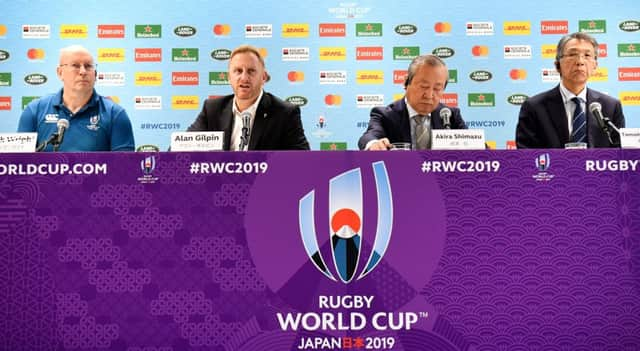Stuart Bathgate: Integrity of Rugby World Cup undermined by shameful decision


Safety is paramount: that is not in dispute. We should take it on trust when the world governing body and the tournament organisers decide that, with Typhoon Hagibis likely to cause severe disruption this weekend in Tokyo, Yokohama and Toyota City, it would be unsafe to hold games there. So it is wholly understandable, and perfectly acceptable, that England and France should not meet in Yokohama tomorrow, and New Zealand and Italy should not play in Toyota City.
But Japan is not a small country, nor is it an unsophisticated one. The imminent arrival of a typhoon is not an unprecedented event, nor was Japan given the right to host the World Cup with just a couple of weeks’ notice.
Advertisement
Hide AdAdvertisement
Hide AdIn other words, it surely cannot be beyond the bounds of possibility for the organisers to have made contingency plans for the eventuality we now face. They have had years in which to do so. Other cities are available, far from the predicted path of the typhoon. Other days are on the calendar, ready to be used for the staging of the last round of the pool stage. Other arrangements are not only possible, but highly desirable.
Instead, the organisers appear to have been swayed, in part, by the perceived need to keep the closing stages of the tournament on schedule. Their wish for an immaculate, on-time climax to this festival of rugby is completely understandable – yet the way in which they have decided to preserve the schedule will ensure that this World Cup is remembered not for whatever brilliant rugby may be played in the final, but for a shameful decision which was taken midway through the tournament.
At least France are still assured of a place in the quarter-finals despite the cancellation of their last game. Even so, they have been deprived of the chance to top Pool C by beating England and potentially claiming a slightly easier quarter-final.
Italy, of course, have no such consolation. They have been eliminated from the competition not because they finished third in their pool after all games were played, but because they were denied the chance to play their last game, in which a win against the All Blacks would have taken them into the last eight. And it doesn’t matter that the Italians would have been highly unlikely to do that: this is a competitive tournament, not a glorified sequence of exhibition games, and Italy have been deprived the opportunity to compete.
At the time of writing, the Scotland-Japan game is still in with a chance of going ahead as planned on Sunday. If it is cancelled, that will simply make things worse, fuelling speculation that the organisers were perfectly happy to make a ruling that ensured the host nation went through to the knockout stages without doing so on their own merits.